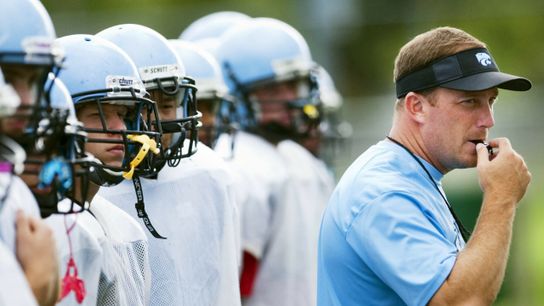We're in the time of year where coaches across football are exalted into new, higher positions: graduate assistants to position coaches, position coaches to coordinators, coordinators to head coaches. When thrust into a new role with new sets of eyeballs looking to you for direction, the natural inclination may be to hide your weaknesses and areas where you may lack knowledge, so as to build credibility with your newfound followers.
But Harvard Business Reviewsays that would be a mistake.
A Harvard study found that nearly 70 percent of leaders felt underprepared for their new roles. Many overcompensated by giving off a false air of perfection and expected the same of those they were in charge of, which in turn created a level of mistrust within the organization. "The followers on whom those unfair standards are imposed typically revolt and withdraw their support," writer Ron Carucci said. "Starved for acknowledgement, such followers wait to pounce on any hint of (hypocritical) deficiency, leaving no room for executive missteps. Executives, fearing criticism and exposure, work to perpetuate the illusion of infallibility — and perfectionism becomes a self-perpetuating prison."
Another trap many new leaders fall into is trying to create an impossible level of fairness across the board.
"While people want to be treated equally, not all jobs are equal; not every contribution holds equal value," Carucci writes, arguing that leaders should be clear in establishing that extraordinary results garner extraordinary rewards.
"One executive we worked with, thinking he was showing empathy, said to an employee, 'I know our bonus structure is messed up, but there’s nothing I can do,'" Carucci wrote. "Making himself a co-victim reduced his credibility as he advertised feeling powerless to advocate for change."
Finally, another common misstep is the feeling to be accessible to all people at all times. "Two-thirds of our respondents claimed they had insufficient time to offer those they lead. The challenge is how to negotiate with each follower what they need and how to provide it," Carucci wrote. "Don’t let militant gatekeepers prevent access to you, but don’t offer unlimited access either — don’t become everyone’s answer ATM. Set clear boundaries and enforce the need to work within them."
All of us, from head coaches to GAs, janitors to presidential candidates, are human, and presenting yourself as something more perfect than human creates an impossible standard to live up to and invites followers to mistrust you. "Satisfy your team’s real needs," Carucci concludes, "and don’t worry about contorting yourself into what you can never be."
